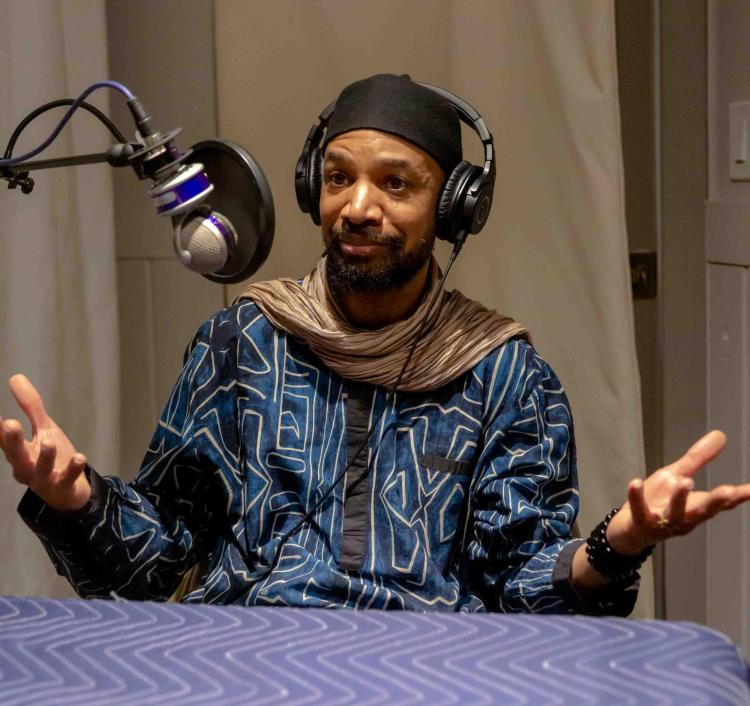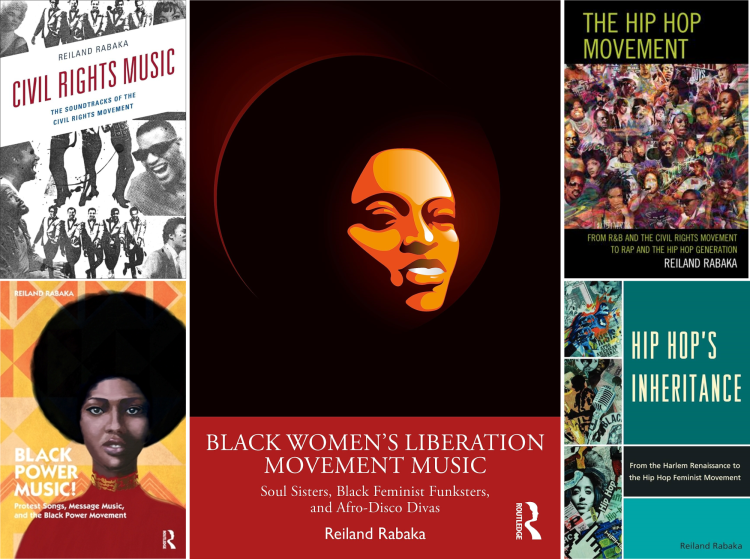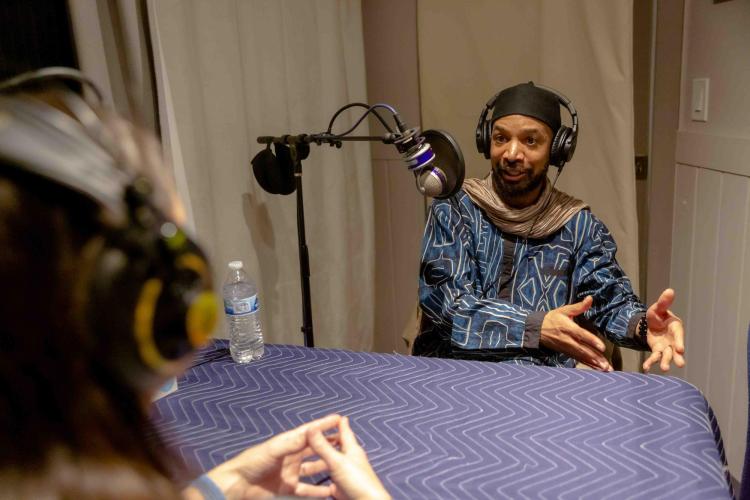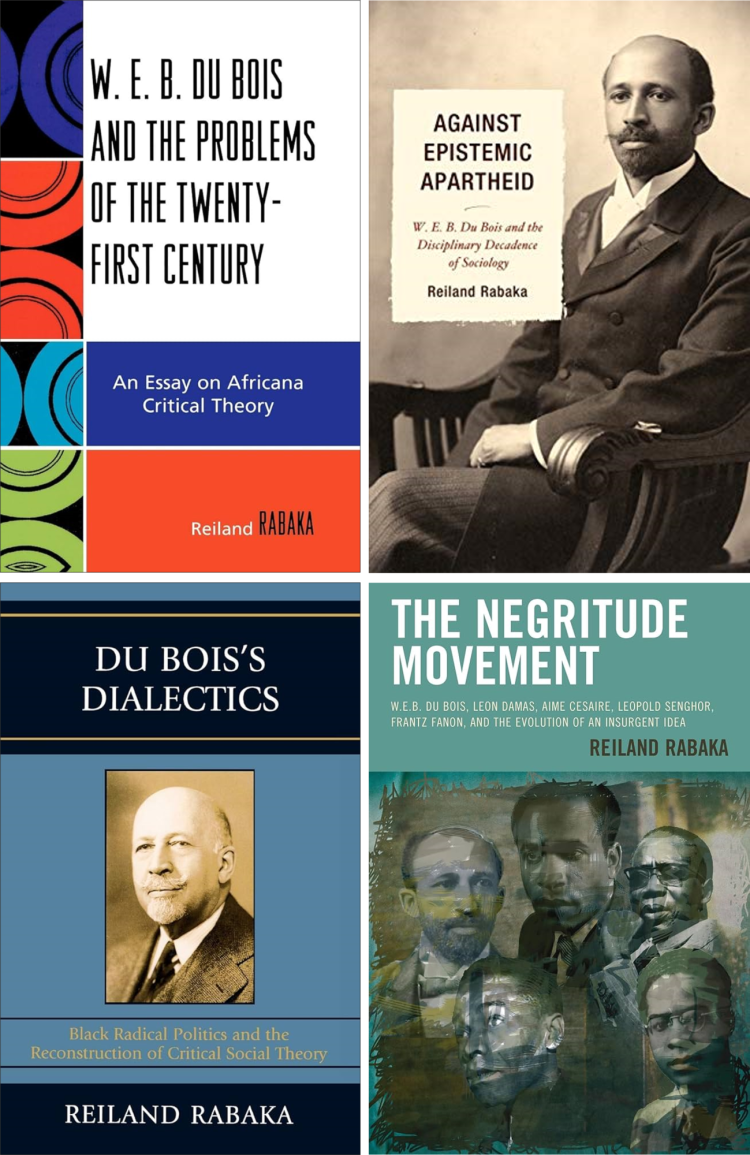Reiland Rabaka, a CU Boulder professor of ethnic studies, joins The Ampersand to discuss art, activism, the importance of building community and how his first-grade teacher introduced him to W.E.B. Du Bois and changed his life
Would there be a Reiland Rabaka without music?
Maybe, but certainly one who is less joyful, less connected, less attuned to the ebbing and flowing of the world and the universe around him.
Of the multitudes he contains, music is his great love, the place he comes home to, the cadence of beating hearts and clapping hands and walking feet.
But musician is just one thing about him. Intellectual, activist, artist, writer and someone almost impossible to stump in a game of “Name the Back-Up Band.”
As a University of Colorado Boulder professor of ethnic studies and inaugural director of the Center for African and African American Studies, Rabaka exists at the junction of multiple disciplines, identities and interests—the epitome of “ANDing.”

Reiland Rabaka is a University of Colorado Boulder professor of ethnic studies and inaugural director of the Center for African and African American Studies. Photo by Kylie Clarke.
He recently joined host Erika Randall, associate dean for student success in the College of Arts and Sciences, on "The Ampersand,” the college’s podcast. Randall—who is a dancer, professor, mother, filmmaker and writer—joins guests in exploring stories about “ANDing” as a “full sensory verb” that describes experience and possibility.
Their discussion started at church and roamed broadly from there.
Rabaka: My first love is gospel music. So, I grew up as a youth minister of music. My mother is actually a theologian, so my mother is the minister, you know. Everybody kind of knows I'm a PK, which means a preacher's kid. I think they just assume that it's my pops, but it's actually my mom. So, that shapes not only your spirituality, but also a gender consciousness because of the way that women are treated in the church, the way that women are erased. And so, my first love remains Mahalia Jackson, Albertina Walker, Shirley Caesar, Clara Ward. These are the kinds of folks my mother and my grandmother were listening to. James Cleveland, Thomas Dorsey, I could do this all day.
Randall: But to get this litany out…
Rabaka: It's really important to roll-call that. I think that probably unlike a lot of other, you know, African-American musicians, my first musical love was, and remains, gospel music. Every day before I listen to anything secular, I listen to a gospel album. After my prayers and my meditation, I start with the music. So, African-American sacred song is my foundation.
I will be keynoting the National Spirituals Conference this month at the University of Denver, and they know that I have a love affair with, first and foremost, the spiritual. So, what they used to call Negro Spirituals, this is the music, the soundtrack of our enslavement. These are songs of not simply heavenly salvation, but earthly liberation.
For me, there's always been a connection, at least from the African-American church I come out of, there's always been a connection between the social gospel and social justice. There's no way we can talk about spirituality that is removed from the material, the actual physical world that we live in. And so, after gospel, Erika, I grew up so poor that as strict as my mother was, she allowed me to play jazz because when I was nine years old, I got my first $100 bill for playing a jazz gig. I thought it was monopoly money, I didn't know it was real money.
Randall: You hadn't seen $100.
Rabaka: Yeah. And I gave it to my mother. She hugged me. She held me. It was a bittersweet moment because when I look back, and just to be real with you, that's also probably the day my childhood ended. You can't just be a little kid when you’re fixing to help your mama make rent from now on. So, as long as you didn't miss Wednesday night prayer meeting, choir rehearsal and church on Sunday, then you can go and swing.
And I was part of a generation, what they were calling it, was a jazz renaissance going on. You know, with folks like Wynton Marsalis, Branford Marsalis, Roy Hargrove, who I went to high school with, by the way, Roy Hargrove. Growing up in Texas…
Randall: Yeah, Texas and jazz. How did that connect?
Rabaka: Well, you know, part of my family being Creole folk from next door in Louisiana, so going back and forth to the jazz and heritage festival. In Texas, hearing gospel, hearing blues just as much as I'm hearing jazz and R&B and funk and soul and hip-hop. And let's not forget the Caribbean-influenced reggae music.
Randall: That was in your house or that was in your head and heart?
Rabaka: That was in my head and heart more. I think that being a kid from the projects and going to all art conservatory schools—I didn't go to regular school, so I never went to a school with a football team or a basketball team or something like that. I went to all art schools and at the time, they would allow one African-American per grade. I literally spent the bulk of my youth training to be a musician. And the way that they trained me, Erika, you've got to be able to play everything.
So, I played klezmer. I played polka. I played country and western. I played Tejano. I played bar mitzvahs. On top of all of the jazz and the gospel and the blues and the soul and the funk, baby, the funk, baby, oh, the funk. You know? For me, it's that versatility, I think that's actually what allowed me to go from the projects to the professor where I'm at.
Randall: That versatility of thinking.
Rabaka: It opens you up.
Randall: Right.
Rabaka: Here's the thing, and I really, really want to stress this and I think maybe this is why somebody like me is able to be on the faculty at the University of Colorado for nearly 20 years. In the schools that I went to, especially by the time I get to junior high school and high school, there's this weird inversion of the junior high school and high school experience.
So, your popularity isn't based on what kind of car your parents drive or how much money they have in the bank account or how big your house is. It's based on your talent. It's based on your gift.
Guess who was the most popular? I said papa-la.

Reiland Rabaka has researched and written extensively about the confluences of music, civil rights, feminism, art and liberation.
Randall: Boom. Boom.
Rabaka: Kid is cool. I went to high school with Erykah Badu. I graduated from the same high school as Norah Jones.
Randall: Norah Jones went to Interlochen, which was my—that's my home.
Rabaka: You see what I'm saying?
Randall: I feel you.
Rabaka: I went to the same high school as Edie Brickell.
Randall: What?
Rabaka: You see what I'm saying?
Randall: I know. So, there was a lineage. There was an expectation or just a mentoring or it was a pressure in that world if you're coming through, or were you the pressure? Because you came through and set the stage.
Rabaka: When your family's depending on you to eat…I think for a lot of the other kids, this was a hobby. But for me, this was the way that I was going to literally swing myself from the projects into an arts conservatory university, an arts conservatory college, so on and so forth. Got accepted to Cal Arts. Got accepted to most of the… I mean, I don't know what school I did not get accepted to.
Randall: And at the end of the day, because you had all these capacities, did you feel like the pressure is on me to get a job in music or now I've got these opportunities, I need to shift to something more stable, air quotes?
Rabaka: If I can be honest with you, I think because I'm first generation, I think folks were just happy I was going. I did get some of the, "You sure you shouldn't be a business major?"
Randall: Was that mom, or was mom always in your corner?
Rabaka: No, it was more my grandmother. My mother's, in some ways, spiritually speaking, a very free spirit, interfaith, open to a lot of things. And to be honest with you, I'm probably the daughter my mother never had. I'm my mother's middle son. I have an older brother and a younger brother, shout out to Robert and Randy, those are their names.
Randall: The three R's.
Rabaka: Yeah. And they got the more conventional… I mean, both of them are named after their fathers. And my mother just went left field, you know? So, I can rock and roll.
Randall: That's why you're always going left.
Rabaka: You know what I'm saying? Because I'm left-handed and when I found out Jimi Hendrix was left-handed and Barack Obama was left-handed and W.E.B. Du Bois was left-handed.

Reiland Rabaka recently joined host Erika Randall in a wide-ranging conversation for "The Ampersand" podcast. Photo by Kylie Clarke.
Randall: OK. Bookmark on Du Bois. So, we're going to go back to Texas one more time and I want to talk about Mrs. Robinson. Because if you're going to say Du Bois, she was the first person to say that name to you. Can you tell me the story in a way you've never told the story before so you can hear it? Because it's a good story.
Rabaka: You know, I think that being precocious and really, when you when you grow up in the church like I did and you start playing, I mean, I was so young they sat me on phone books. So, in the African-American church, they actually cultivate, quote unquote, giftedness, talented-ness, I'm making up words for you.
Randall: We like that here.
Rabaka: And it's one of those things where there's a unique culture within the African-American church of, they say in terms of our gifts and our talents, and you can see this is what works for me as a as a professor. In African-American church culture, it's the cultivation, it's the nurturing of everybody is gifted. See? God don't play favorites.
But if you don't use it, you lose it if you don't consciously develop it. So, all those hours I'm sitting there practicing, when the other kids had video games. You know, I used to feel tight because they could play Sega and Atari and all the cool games. We didn't have that.
Randall: Commodore 64.
Rabaka: You see? So, we didn't have all of that kind of stuff. I wasn't able to see Jordan do all of those crazy… because the TV wasn't on most of the time. I mean, even if you have a TV, it's got the little antenna, you know, with the clothes hanging off it with the foil on the back of it and everything. But if you don't have your electricity on, if you don't have running water, so on and so forth. I think that a lot of the time where I felt tight, I felt maybe a little economically traumatized, humiliated, demoralized, I was in that practice room.
I was knuckling and brawling, attempting to evolve myself. And the reality of the matter is, I had a multiracial, multicultural group of teachers that nurtured this talent. So, on the one hand, the foundation is the African-American church. However, the church sends us out into the world. As you know, one of my favorite spirituals is called “Go and See the World.” And this is something my grandmother will sing to me, often, she sings it often.
Randall: She's still here to sing to you?
Rabaka: My grandmother—I'm sorry, this makes me emotional—my grandmother turns 96 tomorrow. And my grandmother is one of the great loves of my life. And the others, of course, being my other grandmother and my mama. My grandmother, I think you can do the math, if I'm from Texas, my grandmother's 96, Juneteenth was issued 158 years ago.
My grandmother's grandmother was enslaved. So, it's not a coincidence that I would come out an African-American studies professor, that I speak with love-laced words, that I'm trying to bring some level of human understanding to what's going on. Even the rapport, the bond that we have, that culture, Erika, taught me to also check for your life and your struggles. So, it's not just about me, it’s about you and we.
Randall: That's when you say “ubuntu” [a Zulu word roughly translated to “humanity toward others” or “I am, because you are] in your signature.
Rabaka: There you go. So, I am because we are. And how can you and I rescue and reclaim our humanity together? Instead of avoiding my Africanity, the fact that I’m African-American, what happens if we put that front and center and do it in a way that’s not antagonistic to you? And I acknowledge as I just spoke to you, asking about your mother, asking about your son, and so on. The humanity, the shared humanity that we have, for me, that’s what it means to come out of Texas. I mean, this is the state that Juneteenth is all about.
This is the state where I grew up with nine HBCUs that I could throw a rock out of my grandmother’s yard and break a window, and I didn’t do that, but this is how close the HBCU is. I grew up seeing African-American youth with books and dress smart and the richness of that, and also the fact that I didn’t grow up in an all-black neighborhood. I grew up surrounded by Mexican-Americans. I grew up surrounded by Asian-Americans, some Indigenous folks. Because again, you got New Mexico on one side, Oklahoma, Arkansas. I could just go on and on.
Randall: What corner were you?
Rabaka: Dallas.
Randall: Dallas. OK.
Rabaka: But let me answer about Mrs. Robinson, my first-grade teacher. I was, again, young and precocious, a ball of energy. My mother would always say, “Whatever you give the other kids, you need to give him three times as much.” Mrs. Robinson knew that she could speed-dial my mother. In fact, all she needed to say was, “Don’t make me call your mother” and I would back down.
So, it’s Black History Month, Mrs. Robinson has these little placards, larger than a postcard size, of different Black History Month figures. So, you know, Ella Fitzgerald was on one, let’s see, Billie Holiday, you name it. Jesse Owens, Paul Robeson, Zora Neale Hurston, Langston Hughes…
Randall: Jackie Robinson.
Rabaka: You see what I’m saying?
Randall: Yeah. Yeah.
Rabaka: I thought I should get Duke Ellington or Billie Holiday or Thelonious Monk, Dizzy Gillespie, Charlie Parker, Charles Mingus, I could just do this all day long. And I sit up here, I thought at that time, this is my little first-grade mind so just bear with me, I got a Frenchman Du Bois.
Randall: Du Bois.

Introduced to W.E.B. Du Bois by his first-grade teacher, Reiland Rabaka has subsequently researched and written extensively about him.
Rabaka: Right? Because again, I got some Creole folk right on the other side. And I stormed up to Mrs. Robinson’s desk, you know how kids can be, and I can’t believe it, it’s Black History Month, everybody else got Black people and I got a white man, I got a French man named Du Bois, and everything. And she gave me a good talking-to that changed my life.
And this is the power of teachers. She said, “Reiland, if you spent as much time actually reading as you do sitting up here trying to criticize my teaching and what I’m doing, if you don’t go sit down, I’m going to call your mama, boy.” You know? So, I ran back to my desk, sat down, read the card and everything.
I still had my lips stuck out, but I read the card or whatever. And the more I read, the more fascinated, the more intrigued… It actually said that Du Bois went to an HBCU, Fisk University, in Nashville, Tennessee.
So again, my grandmother lives within walking distance of an HBCU. I’m thinking, “Wow, wait, what’s going on?” Then I come to find out that this person had achieved two bachelor’s degrees, two master’s degrees and the equivalent of two PhDs. One of them, he studied at the University of Berlin.
The fact that he was well-traveled, well-read. When I saw photos of him, he was well-dressed. And then there was a connect from the preachers that I’m seeing in the African-American church to the jazz musicians, Miles Davis got, what, GQ Man of the Year was it 10 times in a row? At least seven times in a row. I mean, this guy was clean.
Randall: Yes.
Rabaka: And so for me, learning about Du Bois and the fact that he connected his intellectual pursuits with his social justice pursuits. You know, he founded sociology in the United States of America, he also founded the NAACP, the National Association for the Advancement of Colored People, February the 12th, 1909. Mrs. Robinson walked me into the library, and she just said, “Hey, if you really want to read something, here's some of his books.” Of course, I couldn't make them through it at the first grade, so once they got the children's-level book about Du Bois’ life, I think I kept that checked out.
Randall: It just said stamp, Reiland.
Rabaka: You know what I'm saying?
Randall: Stamp, Reiland.
Rabaka: And it changed my life, to be perfectly honest with you. So not only was he an intellectual, not only was he an activist with the NAACP work,I find out that he wrote five novels.
Randall: The novels he wrote blew my mind. You introduced that to me. That was a gift from you.
Rabaka: Isn't that incredible?
Randall: Yeah, and in the novels, he's also bringing his story forward.
Rabaka: Historical fiction, sociological fiction. I didn't even know such genres existed.
Randall: And it feels like they really were born of the Black experience.
Rabaka: Absolutely. It’s what we would call Afro Modernism. And I think this would explain my preoccupation with the Harlem Renaissance, and in fact, many people say that Du Bois’1903 classic The Souls of Black Folk was a precursor to what happened 15 years later with the beginning of the Harlem Renaissance.
Randall: And when you talk about him being a proto-interdisciplinarian, proto-intersectionalist, and on this podcast, a proto-ANDer, because he is making it up, making it up and transforming through that need not to categorize.
Rabaka: For me, Du Bois is a model, an incessant model because Du Bois was able to be a social scientist, an intellectual, an artist, five novels, nine volumes of poetry, three dozen short stories, two dozen plays, I could go on and on and on, and an activist. So, for me, I mean, maybe those labels fit what I'm up to best—intellectual, artist, activist—maybe those three things, I'm kind of cool with. But I don't want people to silo me off into only one of those.
And I think, Erika, has academia forced folks like you and I to reduce ourselves in order to fit into these little tenure schemes?
Randall: Oh, yeah. I mean, I think that is one of the things where this notion of pushing the idea of we are more than just the category we got hired in has felt so critical to me. We have been stuck into a frame.
Rabaka: And they forced you to in order to achieve tenure. Now, the second some folks achieve tenure, they explode.
Randall: Yeah, and then you can kick back. And you're like, “I've always been into this. I was always doing this trouble.” Did you feel a freedom, or did you come in with it?
Rabaka: You know what, I think I'm not a good example, just because African-American studies is always left of field in the American Academy because of how Eurocentric, heteropatriarchal the American Academy can be. So, my field has always been transdisciplinary. By that I mean I'm in a field, I'm in a discipline that transcends and transgresses the borders and boundaries, the very artificial and arbitrary borders and boundaries of academic disciplines.
What if African-American studies is more about the community than it is the campus? What if African-American studies is actually about me literally being a bridge from the community to the campus, from the campus to the community?
Click the button below to hear the entire episode.
Photos at the top of the page by Kylie Clarke.
Did you enjoy this article? Subcribe to our newsletter. Passionate about ethnic studies? Show your support.



